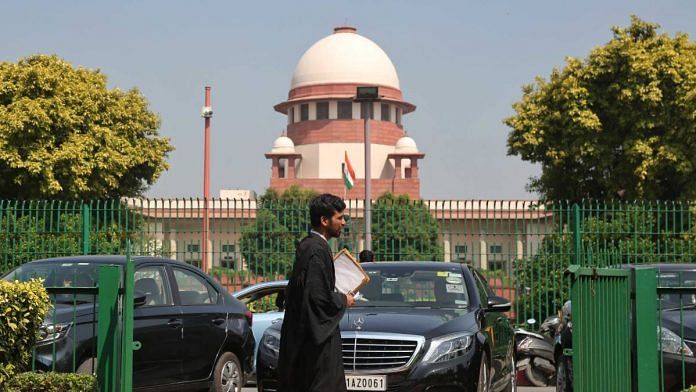New Delhi: The Supreme Court (SC) Wednesday criticised the “sealed-cover” approach used in courts, while devising a new “public-interest immunity” principle.
Sealed cover refers to the practice of courts seeking or accepting information in “sealed envelopes”, which is only accessible to the judges.
The court made the remarks while considering a plea raised by Malayalam TV channel MediaOne against a telecast ban imposed by the Centre. The ban had been upheld by the Kerala High Court, which had accepted documents from the Ministry of Home Affairs in sealed cover.
A Supreme Court bench of Chief Justice of India D.Y. Chandrachud and Justice Hima Kohli, while allowing the channel’s plea and holding that there were no grounds to withhold such information (reasons for denial of security clearance), criticised the approach of the Centre to not disclose information in the name of national security.
“The mere involvement of issues concerning national security would not preclude the state’s duty to act fairly,” read the SC’s order.
The ‘sealed-cover’ exercise has been frequently employed by courts in deciding sensitive matters, including the Rafale jet deal case, the Assam National Register of Citizens matter, and corruption cases being probed by the CBI.
ThePrint explains the new procedure suggested by the SC for ‘public-interest immunity’ proceedings, legal backing for ‘sealed covers’ in India, and other competing standards around the world.
Also read: SC restores TV channel’s licence, says govt’s denial of clearance has ‘chilling effect on freedom’
The new procedure
The new procedure suggested by the SC allows an amicus curia (friend of the court) to be appointed by a court to evaluate whether there is a case for ‘public-interest immunity’.
The amicus will be given access to information that is sought to be withheld and be given an opportunity to speak to both parties to make a reasonable decision on the necessity of disclosure. They will, however, be bound by a non-disclosure oath, meaning that they cannot disclose such grounds (for withholding information) to the parties.
Evaluation of whether the public-interest defence will succeed will happen in a closed setting. In all cases, the court must pass a reasoned order for allowing or dismissing the public-interest immunity claim.
It has, however, been ordered that records of such material shall be preserved by courts to examine in the future, if the need arises.
‘Public-interest immunity’
The principle of ‘public-interest immunity’ allows the state to withdraw material from the public record if it “injures public interest”.
The principle does not allow any reliance by the court or parties involved on such material that has been submitted before the court. The public-interest immunity, effectively, renders the relevant document non-existent for the purposes of the case.
This is not similar to a ‘sealed cover’, which allows the party submitting the documents to rely on the same. This has been recognised as leading to “disproportionate information access” to the other side.
The SC noted that ‘public-interest immunity’ meets the purported objectives of the ‘sealed cover’.
“Public-interest immunity substantially realises the objective of protecting the interests of confidentiality and national security,” the court noted.
Justice Chandrachud and Justice Kohli reiterated that the “least restrictive measure” to protect such claims must be adopted, and considered an array of practices from other countries to decide on the same.
It specifically considered the ‘Totten Principle’, which relates to state secrets. The principle provides that if the claims are “premised on state secrets, they are barred from adjudication”. This means that where the very basis of a claim is a state secret, the case can be dismissed at inception.
In the US, it is accepted that, in exceptional circumstances, courts must act in the interest of national security to prevent disclosure of state secrets.
The SC also recognised the ‘closed-material procedure’ followed in the UK, which is similar to the ‘sealed-cover’ approach.
In that case, the European Court of Human Rights specifically held that there were “less restrictive measures” that could be employed to accommodate security and procedural justice claims.
Origin & legal backing
‘Sealed cover’ in India can be traced to service or administrative purposes, where information pertaining to promotion and service was received in a ‘sealed cover’ to avoid harm to reputation. It was then continued in cases involving sensitive information, such as sexual assault cases.
However, there is no specific legislation that permits courts to accept information in a sealed-cover format.
The SC derives its powers to accept such sealed envelopes under the Supreme Court Rules, which govern the practice of the court.
Under Rule 7 Order XIII of the SC Rules, and Section 123 of the Indian Evidence Act, 1872, the court has the power to call for a sealed cover.
Rule 7 provides that where the chief justice or the court directs certain information to be kept secret, under ‘sealed cover’, or considers it to be of a confidential nature, the confidentiality of the same shall be preserved.
It may also be kept confidential if the disclosure of the same is not considered to be in public interest. No party is allowed to access such information, without an order from the chief justice.
Section 123 of the Evidence Act prohibits disclosure of information derived from “unpublished official records” relating to the officers of the state, without the permission of the department head.
(Edited by Nida Fatima Siddiqui)
Also read: SC’ Adani committee knee-jerk reaction. Needs time and analysis for impartial investigation



